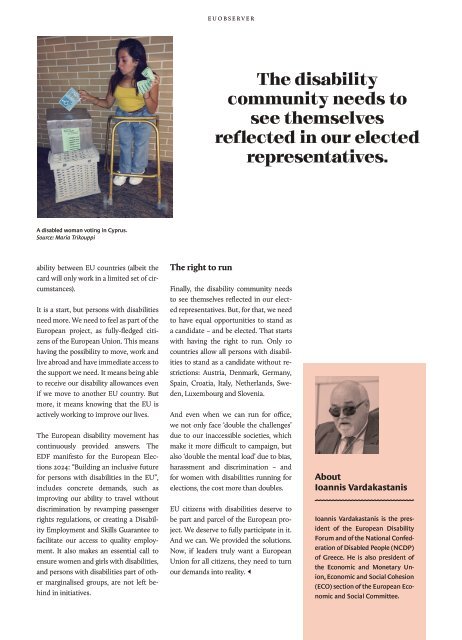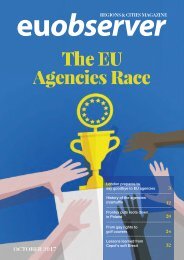EU Elections
EUobserver's guide to the 2024 European Parliament Elections.
EUobserver's guide to the 2024 European Parliament Elections.
- No tags were found...
You also want an ePaper? Increase the reach of your titles
YUMPU automatically turns print PDFs into web optimized ePapers that Google loves.
<strong>EU</strong>OBSERVER<br />
The disability<br />
community needs to<br />
see themselves<br />
reflected in our elected<br />
representatives.<br />
A disabled woman voting in Cyprus.<br />
Source: Maria Trikouppi<br />
ability between <strong>EU</strong> countries (albeit the<br />
card will only work in a limited set of circumstances).<br />
It is a start, but persons with disabilities<br />
need more. We need to feel as part of the<br />
European project, as fully-fledged citizens<br />
of the European Union. This means<br />
having the possibility to move, work and<br />
live abroad and have immediate access to<br />
the support we need. It means being able<br />
to receive our disability allowances even<br />
if we move to another <strong>EU</strong> country. But<br />
more, it means knowing that the <strong>EU</strong> is<br />
actively working to improve our lives.<br />
The European disability movement has<br />
continuously provided answers. The<br />
EDF manifesto for the European <strong>Elections</strong><br />
2024: “Building an inclusive future<br />
for persons with disabilities in the <strong>EU</strong>”,<br />
includes concrete demands, such as<br />
improving our ability to travel without<br />
discrimination by revamping passenger<br />
rights regulations, or creating a Disability<br />
Employment and Skills Guarantee to<br />
facilitate our access to quality employment.<br />
It also makes an essential call to<br />
ensure women and girls with disabilities,<br />
and persons with disabilities part of other<br />
marginalised groups, are not left behind<br />
in initiatives.<br />
The right to run<br />
Finally, the disability community needs<br />
to see themselves reflected in our elected<br />
representatives. But, for that, we need<br />
to have equal opportunities to stand as<br />
a candidate – and be elected. That starts<br />
with having the right to run. Only 10<br />
countries allow all persons with disabilities<br />
to stand as a candidate without restrictions:<br />
Austria, Denmark, Germany,<br />
Spain, Croatia, Italy, Netherlands, Sweden,<br />
Luxembourg and Slovenia.<br />
And even when we can run for office,<br />
we not only face ‘double the challenges’<br />
due to our inaccessible societies, which<br />
make it more difficult to campaign, but<br />
also ‘double the mental load’ due to bias,<br />
harassment and discrimination – and<br />
for women with disabilities running for<br />
elections, the cost more than doubles.<br />
<strong>EU</strong> citizens with disabilities deserve to<br />
be part and parcel of the European project.<br />
We deserve to fully participate in it.<br />
And we can. We provided the solutions.<br />
Now, if leaders truly want a European<br />
Union for all citizens, they need to turn<br />
our demands into reality. ◄<br />
About<br />
Ioannis Vardakastanis<br />
Ioannis Vardakastanis is the president<br />
of the European Disability<br />
Forum and of the National Confederation<br />
of Disabled People (NCDP)<br />
of Greece. He is also president of<br />
the Economic and Monetary Union,<br />
Economic and Social Cohesion<br />
(ECO) section of the European Economic<br />
and Social Committee.

















